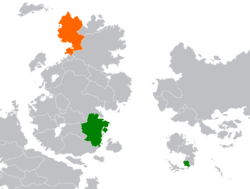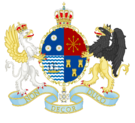Aquitayne-Valkea relations: Difference between revisions
Jump to navigation
Jump to search
mNo edit summary |
|||
| (2 intermediate revisions by the same user not shown) | |||
| Line 4: | Line 4: | ||
| party1 = Aquitayne | | party1 = Aquitayne | ||
| party2 = Valkea | | party2 = Valkea | ||
| map = | | map = Aq-Valkea_relations.png | ||
| filetype = | | filetype = | ||
| size = | | size = | ||
| Line 27: | Line 27: | ||
===Re-establishment of relations=== | ===Re-establishment of relations=== | ||
Diplomatic relations between Aquitayne and Valkea were reestablished in the early | Diplomatic relations between Aquitayne and Valkea were reestablished in the early 1950s when a new wave of democratization and market freedoms were passed through the Kansallist government. | ||
===Nuclear weapons crisis=== | |||
==Trade, investment and the economy== | ==Trade, investment and the economy== | ||
Latest revision as of 01:16, 21 March 2024
 | |
Aquitayne |
Valkea |
|---|---|
| Diplomatic mission | |
| Valkean Embassy, Telora | Aquitaynian Embassy, Källälivi |
| Envoy | |
| Ambassador Luukas Virtanen | Ambassador Ashiro Hatomaka |
| This article is part of a series on |
| Politics of Aquitayne |
|---|
 |
Relations between the Constitutional Monarchy of Aquitayne and the Republic of Valkea has largely remained friendly throughout history.
History
Valkean monarchy
Aquitayne supported the Valkean monarchy through indirect and direct means, especially during the Valkean Civil War.
Kansallist era
After the defeat of the monarchists in 1922, Aquitayne formally denounced the Kansallist government and severed ties with Valkea entirely, claiming that the true government was in exile as the royal family had fled to Aswick towards the end of the war.
Re-establishment of relations
Diplomatic relations between Aquitayne and Valkea were reestablished in the early 1950s when a new wave of democratization and market freedoms were passed through the Kansallist government.